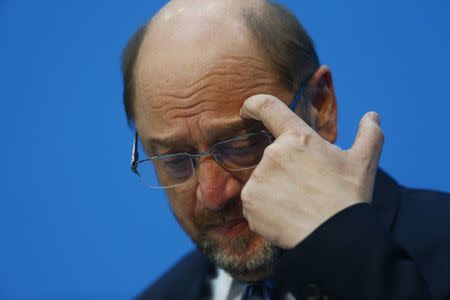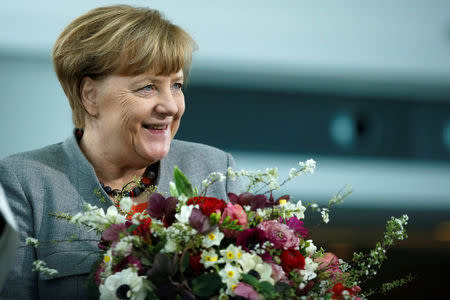German SPD boss drops foreign minister bid to shore up support for coalition
By Michelle Martin
BERLIN (Reuters) - The embattled leader of Germany's Social Democrats (SPD) abruptly gave up plans on Friday to become its next foreign minister, hoping to shore up support among SPD members for a new coalition with Angela Merkel's conservatives.
The SPD agreed on Wednesday to form a new "grand coalition" with the conservatives, over four months after an election, but the 464,000-strong party rank and file could still scupper the deal in a ballot. Its results will be announced on March 4.
Many grassroots members of the centre-left SPD are sceptical about another tie-up with the conservatives after serving in a similar coalition in 2013-17. The SPD then suffered its worst result of the post-war era in September's election.
SPD leader Martin Schulz drew strong criticism in the party after he announced on Wednesday that he would resign as SPD chairman to become foreign minister, after promising before the election that he would not serve in a Merkel-led government.
Merkel, who will secure a fourth term as chancellor if the coalition deal holds, has also come under fire from some in her own camp who say she has made too many concessions to the SPD, including handing it control of the powerful finance ministry.
Merkel is anxious to get a government in place and end more than four months of political limbo that have hampered decision-making in Germany, Europe's largest economy, and caused concern among partners in the European Union who look to Berlin for leadership in facing challenges from eurozone reform to Brexit.
Schulz, who originally strongly opposed another tie-up with the conservatives only to become one of its leading advocates, has lost political credibility but hopes his decision to step aside will now encourage SPD members to back the coalition deal.
A Forsa poll had indicated that almost three-quarters of Germans thought it would be wrong for Schulz to become foreign minister. "I sincerely hope that this (decision) will end the personnel debates within the SPD," Schulz, a former president of the European Parliament, said in a statement.
YOUTHFUL DISCONTENT
Schulz, 62, will also step down as party chairman, and his likely, 47-year-old successor, Andrea Nahles, said the party would now focus on policy content ahead of the ballot.
"I know it wasn't an easy decision for him," Nahles told reporters in her home village of Weiler in western Germany, saying Schulz deserved respect and recognition for stepping aside so as not to jeopardise the party vote on the coalition.
Asked if Sigmar Gabriel would remain foreign minister, she said party leaders would soon decide on a way forward, but their primary focus now was securing a "yes" vote from rank and file.
Kevin Kuehnert, leader of the SPD youth wing, had strongly criticised the focus on staffing over policy in recent days and said some of the top brass needed "to put their ego on the back burner" so members due to vote on the coalition could focus on evaluating the content of the agreement instead.
Kuehnert, 28, is travelling around Germany urging members to vote against the deal. He told broadcaster SWR that he expected a minority government to take charge in Germany, at least for a few months, if SPD members heeded his call.
Discontent also simmered in parts of the conservative bloc on Friday. Paul Ziemiak, leader of the bloc's youth wing, called for a broad discussion about the longer-term future of Merkel's Christian Democratic Union (CDU) and its leadership.
"We shouldn't only talk about how we want to shape the next four years in Germany but also what the CDU will stand for in future, which topics we can win elections with in the next 10 years and people go along with topics," he said.
Peter Hauk, agriculture minister in the wealthy southwestern state of Baden-Wuerttemberg, said Merkel should enable a handover of power within the current four-year legislative period.
Merkel, 63, who long seemed immune to criticism from within her own ranks, came under fire this week after agreeing to have just six ministers in the cabinet - the same number as the SPD, which won fewer votes in the election.
Some commentators have suggested a mid-term review due two years into the government could offer Merkel the opportunity to step down gracefully from a job she has held since 2005.
(additional reporting by Gernot Heller, Andrea Shalal and Reuters Television; Writing by Michelle Martin and Andrea Shalal; Editing by Mark Heinrich)

 Yahoo News
Yahoo News 

